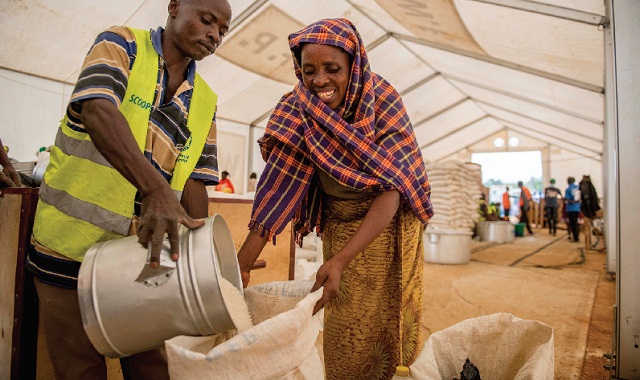
Kampala, Uganda | THE INDEPENDENT | Oxfam assessment on humanitarian funding flows to local and national actors in Uganda has revealed a 700 billion shillings increase in the last two years.
The assessment released by Oxfam’s humanitarian policy advisor, Anita Kattakuzhy, in Kampala on Tuesday shows that United Nations and other International organisation have injected huge amounts of money into Uganda to cater for disasters particularly swelling numbers of refugees.
Kattakuzhy’s valuation dubbed Money Talks II shows humanitarian aid increased almost 1.3 trillion shillings in the last two years compared to 567 billion shillings that was being donated to the country to cater for disasters.
Nevertheless, Oxfam said the money was necessary to be increased because Uganda has been registering an influx in refugee numbers thus putting enormous pressure on communities, the land and the capacities of humanitarian and development actors.
“To support the significant increase in humanitarian need, the amount of international humanitarian assistance (IHA) flowing to Uganda more than double over the two years from US$154m (567 Billion Shillings) to US348.6m [1.284 Billion Shillings],” Kattakuzhy said while presenting the findings.
By June 2018, Uganda’s refugee population was an estimated to be almost 1.5 million refugees a record high with 1 million people coming from South Sudan, 288766 from Democratic Republic of Congo –DRC, 42656 from Burundi, 37193 from Somalia and 37272 from other countries like Eritrea, Ethiopia, Rwanda and Sudan.
Kattakuzhy, however, expressed concern that local and national humanitarian actors did not benefit much from the increased aid as most of the money was utilized by government with its signposted transition planning.
“The share of this provided to local and national humanitarian actors fell from 13 percent to 8 percent. The government of Uganda was the largest recipient in both years, in line with signposted transition planning through UNHCR’s comprehensive refugee response framework in Uganda,” Kattakuzhy said.
In response on increased humanitarian aid, Jennifer Namuyangu, State Minister for Local Government, said there was need to deliver the money directly to local and national non-governmental organisations.
Namuyangu said it was time government should always be informed how much has been given to an international NGO that is deliver humanitarian aid projects. Local content such as public-private partnership should be increased thus local NGO and companies can also be benefit from the funding and development.
Last year, there were reports that refugee numbers in Uganda had been exaggerated by 300,000 refugees. Office of the Prime Minister –OPM and UNHCR conducted an investigation that revealed that refugee figures stood at 1.1 million people as opposed to 1.48 million refugees.
This led to the suspension of commissioner for refugees Apollo Kazungu, and his three senior staff Walter Omondi, John Baptist Sentamu and Francis Nkwasibwe.
******
URN
 The Independent Uganda: You get the Truth we Pay the Price
The Independent Uganda: You get the Truth we Pay the Price



